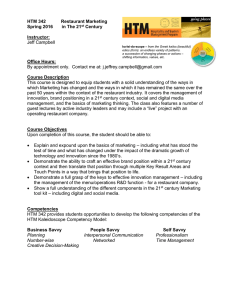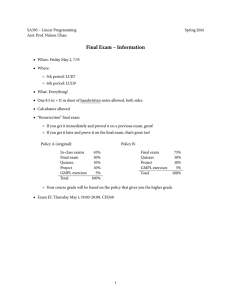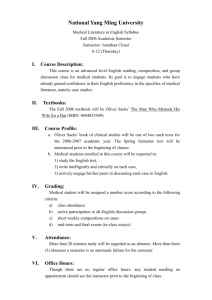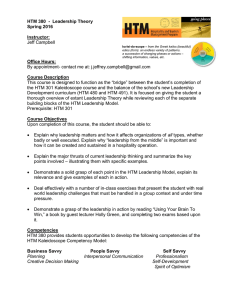Jeff Campbell HTM 455 - Hospitality Financial
advertisement
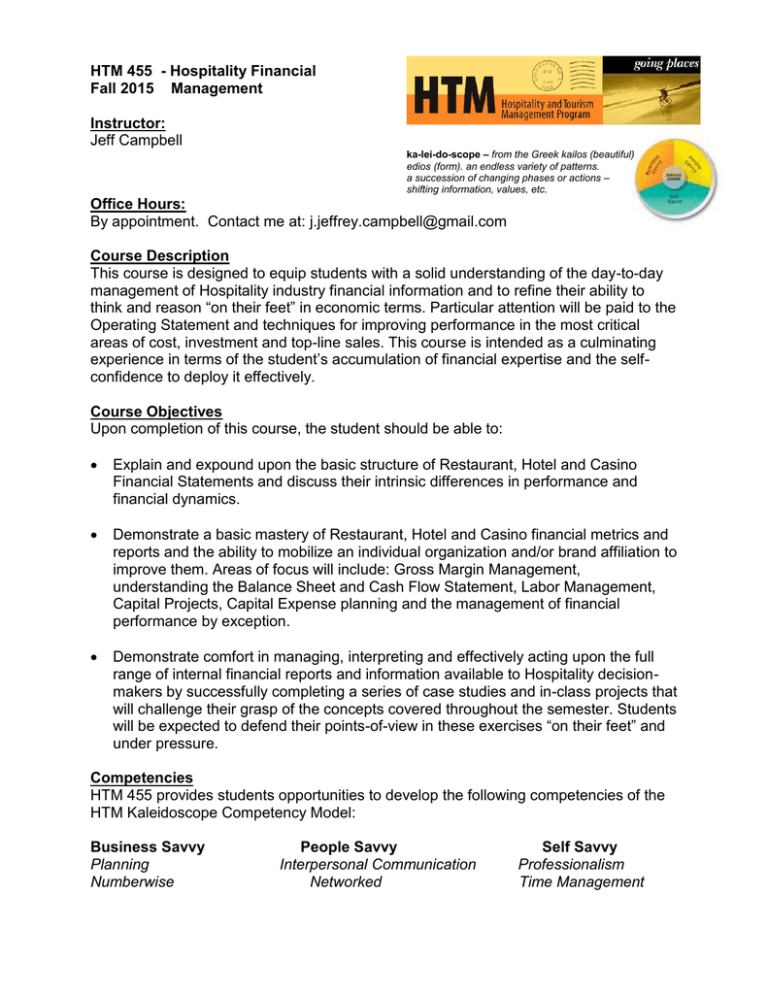
HTM 455 - Hospitality Financial Fall 2015 Management Instructor: Jeff Campbell ka-lei-do-scope – from the Greek kailos (beautiful) edios (form). an endless variety of patterns. a succession of changing phases or actions – shifting information, values, etc. Office Hours: By appointment. Contact me at: j.jeffrey.campbell@gmail.com Course Description This course is designed to equip students with a solid understanding of the day-to-day management of Hospitality industry financial information and to refine their ability to think and reason “on their feet” in economic terms. Particular attention will be paid to the Operating Statement and techniques for improving performance in the most critical areas of cost, investment and top-line sales. This course is intended as a culminating experience in terms of the student’s accumulation of financial expertise and the selfconfidence to deploy it effectively. Course Objectives Upon completion of this course, the student should be able to: Explain and expound upon the basic structure of Restaurant, Hotel and Casino Financial Statements and discuss their intrinsic differences in performance and financial dynamics. Demonstrate a basic mastery of Restaurant, Hotel and Casino financial metrics and reports and the ability to mobilize an individual organization and/or brand affiliation to improve them. Areas of focus will include: Gross Margin Management, understanding the Balance Sheet and Cash Flow Statement, Labor Management, Capital Projects, Capital Expense planning and the management of financial performance by exception. Demonstrate comfort in managing, interpreting and effectively acting upon the full range of internal financial reports and information available to Hospitality decisionmakers by successfully completing a series of case studies and in-class projects that will challenge their grasp of the concepts covered throughout the semester. Students will be expected to defend their points-of-view in these exercises “on their feet” and under pressure. Competencies HTM 455 provides students opportunities to develop the following competencies of the HTM Kaleidoscope Competency Model: Business Savvy Planning Numberwise People Savvy Interpersonal Communication Networked Self Savvy Professionalism Time Management Resources Kremer, Chuck, Rizzuto, Ron and Case, John; Managing By The Numbers: A Commonsense Guide To Understanding And Using Your Company’s Financials; Perseus (2000); ISBN 0-7382-0256-8 Blackboard Computer-based learning, using Blackboard, will be a part of the class. All students should get a Blackboard account and visit the HTM 455 course site every Tuesday before class. Visit http://courses.sdsu.edu. Students will obtain weekly announcements, download materials, and turn in online assignments here. Structure and Assessment In addition to reading the required text, students are required to actively participate in a variety of activities designed to practice their self savvy competencies. In addition, students must satisfactorily complete their online portfolio as a condition of graduation. Quizzes 30% Final Case (Team) In- Class Exercises 30% 5% HTM 455 Lectures & Discussions (In-class) Mid-Term Exam 30% 5% Final Case: Team Presentation 30% of the final class grade will be based upon Student Team Presentations of a solution to a Case Study requiring the development of a comprehensive Game Plan for the improvement of the financial performance of a designated Hospitality concept. This Case will be the culmination of the course and will demand the integration of all of the various managerial techniques and disciplines to which the students will have been exposed during the semester. The case will culminate in a 10-15 page written report and a 15:00 oral presentation delivered by selected team members. Mid-Term Exam 30% of the student’s grade for the class will be based upon his/her grade on the Mid-Term Exam. Quizzes Students will generate 30% of their final grade based upon their scores on the six quizzes that will be offered during the semester. Quiz questions will be based upon class lecture material, guest lectures, and the content in in-class exercises and discussions. In-Class Exercises 5% of the student’s final grade will be based upon their participation in and performance on the regular in-class exercises featured in HTM 455. Engagement and Class Discussion 5% of the final grade will be based on other in-class discussions and activities. Appropriate participation includes preparation, engagement in class discussions, sharing personal experiences and treating guest lecturers with attention and respect. Punctuality will also count. Grading Evaluation Final Case Study (Teams) Mid-Term Exam Quizzes In-class Exercises Engagement and Class Discussions 94 and above 90-93 87-89 84-86 80-83 A AB+ B B- 77-79 74-76 70-73 60-69 Below 60 Weight 30% 30% 30% 5% 5% C+ C CD F Academic Integrity The faculty and staff demand the highest levels of academic and professional integrity in all work at San Diego State University and especially in the HTM program. Positive leadership cannot exist without integrity and your actions determine your level of integrity. Plagiarism, cheating on exams or any other type of academic dishonesty, will be referred directly to the Office of Student Rights and Responsibilities for disciplinary action. . Optional Industry Experiences You will have opportunities throughout the semester to get involved in the industry. San Diego professionals in the HTM industry are solidly behind the HTM degree program and will offer job shadows, training sessions, meetings, and other mentor opportunities throughout the semester. Students are encouraged to make contacts early, learn about the tremendous array of opportunities in the field, and engage themselves in practical experiences to complement the classroom experiences. As part of this opportunity, we will have guest lecturers from the Hospitality Industry – or other fields of endeavor – as part of the semester’s program. You are encouraged to prepare ahead of time for any such occasions and be ready to take advantage of the opportunity to ask questions and to interact with these guests. Meeting Standards To receive full credit for assignments, they must be submitted on time in a complete and error-free fashion (e.g. typos). All assignments are due at the beginning of class on the due date specified in the attached course outline. I will be available to discuss papers and presentations with you before they are due. I can be used as a “sounding board” for your ideas and outlines and, as time allows, I will be happy to read rough drafts and make suggestions. All papers and presentations will be graded based on content (how deeply you have thought about the topic, integration of your experiences with course concepts, communication of insights, accuracy of concept application, etc.) and presentation (organization, grammar, spelling, style, etc.). Remember, you will be evaluated on both what you say and how you say it. No make up exams will be given after the fact. If you know for certain you cannot make an exam, please see me prior to the test day. Please inform me if any special circumstances arise for you during the semester. That is, if you are having difficulty in class due to extenuating outside circumstances, please talk to me as soon as possible so we can minimize the effects of these circumstances. Remember, HTM is all about exceeding expectations!
